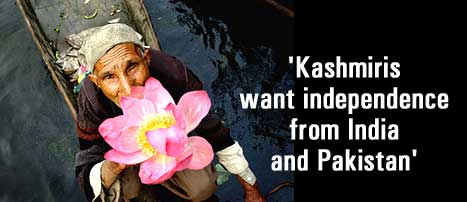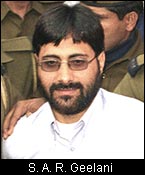
Syed Abdul Rehman Geelani looks anything but a terrorist. He seems more like a poet who missed his calling.
But the Delhi police believe the lecturer isn't as innocent as he looks. They accuse him of being one of the conspirators behind the terrorist attack on Parliament on December 13, 2001.
 | The Attack on Parliament |  | |
|
Geelani's face lights up when he breaks into a smile, but the effort sometimes betrays the impact of the time he has spent in incarceration. He was in Mumbai this week to attend a meeting and told Senior Copy Editor Dhiraj Shetty how a nondescript lecturer spent 20 months or so as one of India's most hated men.
How did you get involved with the Kashmir issue?
In my college days, I was a human rights activist. Later, I was a member of the Jammu and Kashmir Council for Human Rights [a non-governmental organisation] for some time, when I had the opportunity to express my views, including on the Kashmir issue, at various public forums.
How long have you lived in Delhi?
For over 12 years now. I came to Delhi to complete my studies and then stayed on after getting a job at the Zakir Hussain College.
How did you get embroiled in the Parliament attack case?
I don't know. The Delhi police will be able to tell you that.
Of all the people, including Kashmiris, in Delhi, what made them pick you up?
I don't know. But I have been speaking about the abuse of human rights in Kashmir and about the problems there. It is possible that I, among many others, came to the notice of the authorities.
 You were imprisoned in Tihar jail. Were you treated like any other accused?
You were imprisoned in Tihar jail. Were you treated like any other accused?
No. I was in solitary confinement for several months. The prison authorities did not let even light enter my 7x10 square foot cell. They had covered all openings with dark cloth.
Initially, I was not given even water to drink. There was a toilet inside the cell, but without proper flushing facilities. It was unhygienic.
Most people would break down in such circumstances. How did you cope?
Initially, I thought it was all a big mistake and I would soon be released. When that did not happen, I decided to fight it out. I was innocent and that kept me going.
What did you think of in those days when you were confined to a dark cell?
I was concerned about my family. But I decided to strengthen my resolve, vowed not to break down, not to give in, and to prove my innocence.
When did you begin to think that you were being framed?
When I was taken to a court for legal formalities regarding my custody. I was dealt with as if I were guilty though the trial was yet to begin. That is when I realised I was in trouble.
Did you get to meet your family?
Yes, but not in the circumstances that you would imagine. My family was often picked up by the police and taken to certain places where I too would be taken and told they would be harmed if I did not confess. There may not be any official records to prove this, but I know at least one place where they were taken. Eventually, I sent them to Kashmir.
Were you always in solitary confinement? Without newspapers or books to read?
I was always in solitary confinement, but after several appeals to the court, I got some books to read, through my lawyers. I was not allowed to read newspapers, but eventually, after much struggle, I got access to them too. But they were censored. Often, all I got was a skeleton of what must have been a newspaper.
Which were the books you read in jail?
Those by Kahlil Gibran. I am a fan of his.
And newspapers?
I asked for The Asian Age and The Hindu.
Any particular reason?
The Asian Age is full of news, no advertisements, while The Hindu is a good paper.
What was the attitude of your fellow prisoners? Were they hostile?
Unfortunately, yes. Only the Kashmiris there thought I was innocent.
Why were the others hostile?
The propaganda of the Delhi police, broadcast through the media. They sought to project a certain image of me, that of a terrorist, without any proof to back their case. At least my acquittal proves my case, that I am innocent.
Are people now convinced you are innocent?
That is the sad part. There are still many who think I escaped using some legal loophole whereas the court acquitted me because the Delhi police failed to prove their case.
Did you face any problems after being acquitted?
Some time back I was looking for a house. But no one was willing to sell one to me. Besides, policemen are always tailing me. Recently, when I took my family for a holiday to Goa, I met one person. Later it transpired that some Intelligence Bureau people called on him and questioned him.
My former teacher, who I know is fond of me, was reluctant to meet me. He is an established academician and would not like to risk attracting the ire of the government. I do not blame him, I understand his plight and know he sympathises with me.
This is how I am harassed. Tell me, in these circumstances, who would like to associate with me?
How about your family, relatives?
They support me wholeheartedly.
Your college? Your colleagues? Your students?
The day after I was released, I went to resume work. Everyone had come to welcome me. It was touching. My students told me [even when I was imprisoned]: whatever anyone says, we know you are innocent.
What do you teach?
Arabic. I love it. It is a beautiful language.
How did your family cope during the time you were in prison?
They returned to Kashmir because it was becoming difficult to survive in Delhi. Schools would not admit my children and well-wishers, including relatives, did not want to associate with them in public fearing police harassment. I brought them back to Delhi after my acquittal. Even at that time, I had difficulty getting admission for my kids, but eventually one school did take them.
Did you need to beg them or use any influence?
No. The school was good enough to admit them on merit.
Were the children aware of your imprisonment?
They were too young to understand everything. My son was 5 or 6 and my daughter eight at that time. But after my release, my son gave me a list of instructions on what to do and what not to do so that the police do not pick me up again.
In hindsight, why did all this happen to you?
Because I am a Muslim, a Kashmiri, and teach Arabic. What else can I say?
Is there a desire now to hit back at the government?
I am thinking of seeking an explanation, through the courts, for the harassment I had to endure. My house was searched after I was arrested, but since the police did not find anything to incriminate me, there is no official entry in their records. I was tortured to extract a confession. Owing to that, I have some trouble with my fingers. I can write only a few words at a time as the fingers begin trembling. When I was in solitary confinement in Delhi's Tihar jail, I was not given proper protection from the natural elements, which has resulted in pain in my knees.
Did this experience bring about any change in your life?
I realised that many people are languishing in jail, sometimes not knowing why. Some have been arrested for various crimes, but their case has not come up for trial for several years. Some have gone mad waiting for a trial and owing to the inhuman conditions inside. I want to take up their cause. I want the government to speed up the justice system. I do not have a clear plan how to go about it as yet, but am working on it.
Of course, my commitment to Kashmir is unshaken. I want to highlight the problems of Kashmir, its people and its youth.
What is your take on the Kashmir issue?
The terrorism there is a response to the atrocities of the government, which is not concerned about the aspirations of the people.
India and Pakistan have fought three wars on Kashmir though neither is rich enough to afford wars. The money spent on security forces, on maintaining troops in Siachen, is a waste and can be put to better use, for the benefit of the people. India is suffering a huge financial burden due to Kashmir. Won't all of us be better off if this same money were used to develop J&K and other states?
What about the recent bon homie between India and Pakistan?
The two countries should help resolve the Kashmir issue keeping the aspirations of the Kashmiri people in mind.
What are these aspirations?
Kashmiris want their state to be unified, and independence from both India and Pakistan.
Did any political party approach you after your acquittal?
Many offered support.
Did you consider entering Parliament or the Jammu and Kashmir assembly to espouse your cause?
No. It is not the most effective way. It is better to talk to the youth, the people, directly.
What is your reaction to the notice issued to you by the Supreme Court today [Monday]?
 | Also Read |  | |
|
I heard the Supreme Court has issued a notice to me [on an appeal by the Delhi police against Geelani's acquittal], but do not know the details as yet.Main Photograph: Ami Vitale/Getty Images S A R Geelani Photograph: Ranjan Basu/Saab Press